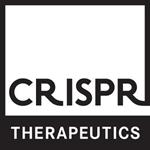News Release
|
View printer-friendly version
|
<< Back |
-Provides update in ongoing Phase 1/2 clinical trials of CTX001® for patients with severe hemoglobinopathies-
-Enrolling in Phase 1/2 clinical trial of CTX110™, targeting CD19+ malignancies-
ZUG,
“We have made significant progress across several of our development programs, including the ongoing enrollment of CTX001 studies in both beta thalassemia and sickle cell disease, initiation of a clinical trial for our allogeneic CAR-T therapy for CD19+ malignancies, and the expansion of our collaboration with Vertex into Duchenne Muscular Dystrophy and Myotonic Dystrophy Type 1,” said
Recent Highlights and Outlook
- Beta thalassemia and sickle cell disease
CRISPR Therapeutics provided an update from the ongoing Phase 1/2 study of CTX001, an investigational, autologous, CRISPR/Cas9 gene-edited hematopoietic stem cell therapy being evaluated for patients suffering from transfusion-dependent beta thalassemia (TDT) and severe sickle cell disease (SCD).
- Enrollment in both Phase 1/2 studies of CTX001 in patients with TDT and in patients with severe SCD is ongoing. Based on the progression of the programs,
CRISPR Therapeutics expects to obtain preliminary safety and efficacy data in late 2019.
- The first patient treated with CTX001 in a Phase 1/2 clinical study of patients with TDT remains transfusion independent, greater than four months following engraftment.
- The first patient has been treated in a Phase 1/2 clinical study of CTX001 in severe SCD in the U.S.
- Immuno-Oncology
CRISPR Therapeutics announced today that it is currently enrolling patients in its Phase 1/2 trial to assess the safety and efficacy of CTX110, its wholly-owned allogeneic CAR-T cell therapy targeting CD19+ malignancies. The Company’s proprietary CRISPR-based allogeneic CAR-Ts have the potential to create the next-generation of cell therapies that may have a superior product profile compared to current autologous therapies and allow accessibility to broader patient populations.
CRISPR Therapeutics continues to advance additional allogeneic CAR-T candidates toward clinical development including CTX120™, targeting B-cell maturation antigen (BCMA) for the treatment of multiple myeloma and CTX130™, targeting CD70 for the treatment of solid tumors and hematologic malignancies. The Company continues to scale its capabilities to rapidly advance these programs into and through the clinic.
- Other Programs
- In June,
CRISPR Therapeutics and Vertex expanded their collaboration and entered into an exclusive licensing agreement to discover and develop gene editing therapies for the treatment of Duchenne Muscular Dystrophy (DMD) and Myotonic Dystrophy Type 1 (DM1).CRISPR Therapeutics continues to make advancements with programs utilizing an in vivo approach, which remains a key area of focus.
- Earlier this month,
CRISPR Therapeutics announced that it will present an oral presentation at the 55th Annual Meeting of theEuropean Association for the Study of Diabetes (EASD), taking placeSeptember 16 to 20, 2019 , inBarcelona, Spain (abstract #9). The presentation will demonstrate the progress made byCRISPR Therapeutics and its partner, ViaCyte, in generating an allogeneic immune-evasive clonal pluripotent stem cell line capable of differentiating into pancreatic precursor cells as a potential therapy for type 1 diabetes.
- In June,
- Other Corporate Matters
- As the Company previously disclosed in
June 2019 ,CRISPR Therapeutics received notification that the United States Patent and Trademark Office (USPTO) has initiated an interference proceeding at the Patent Trial and Appeal Board between certain pending U.S. patent applications co-owned by theUniversity of California , theUniversity of Vienna and Dr.Emmanuelle Charpentier (collectively, the “CVC Group”) and certain patents and a patent application currently owned by theBroad Institute ,Harvard University and theMassachusetts Institute of Technology , all of which are related to the single guide format of CRISPR/Cas9 genome editing technology in eukaryotic cells. As ofJuly 2019 , the USPTO has granted ten patents to the CVC group. None of these issued patents are involved in the interference.
- As the Company previously disclosed in
Second Quarter 2019 Financial Results
- Cash Position: Cash as of
June 30, 2019 , was$427.9 million , compared to$437.5 million as ofMarch 31, 2019 , a decrease of$9.6 million as cash operating expenses were offset by$29.7 million net proceeds from financing activities. Considering the$175 million cash received from Vertex in July under the expanded collaboration agreement for DMD and DM1, proforma cash for the company exceeds$600 million .
- Revenues: Total collaboration revenues were
$0.3 million for the second quarter of 2019 compared to$1.1 million for second quarter of 2018.
- R&D Expenses: R&D expenses were
$39.5 million for the second quarter of 2019 compared to$25.6 million for the second quarter of 2018. The increase was driven by headcount and services expense supporting the advancement of the hemoglobinopathies program, the broadening of the wholly-owned immuno-oncology portfolio, as well as increased investment in the Company’s CRISPR/Cas9 platform research.
- G&A Expenses: General and administrative expenses were
$15.8 million for the second quarter of 2019 compared to$12.7 million for the second quarter of 2018. The increase was driven by headcount-related expense and external professional and consulting service expense.
- Net Loss: Net loss was
$53.7 million for the second quarter of 2019 compared to a loss of$38.4 million for the second quarter of 2018, driven predominantly by increased R&D expense in the quarter.
About CTX001
CTX001 is an investigational ex vivo CRISPR gene-edited therapy that is being evaluated for patients suffering from TDT or severe SCD in which a patient’s hematopoietic stem cells are engineered to produce high levels of fetal hemoglobin (HbF; hemoglobin F) in red blood cells. HbF is a form of the oxygen carrying hemoglobin that is naturally present at birth and is then replaced by the adult form of hemoglobin. The elevation of HbF by CTX001 has the potential to alleviate transfusion requirements for TDT patients and painful and debilitating sickle crises for SCD patients.
CTX001 is being developed under a co-development and co-commercialization agreement between
About the Gene-Editing Process in These Trials
Patients who enroll in these studies will have hematopoietic stem cells collected from peripheral blood. The patient’s cells will be edited using the CRISPR/Cas9 technology. The edited cells, CTX001, will then be infused back into the patient as part of a stem cell transplant, a process which involves, among other things, a patient being treated with high dose chemotherapy and/or radiation therapy. Patients undergoing stem cell transplants may encounter side effects (ranging from mild to severe) that are unrelated to the administration of CTX001. Patients will initially be monitored to determine when the edited cells begin to produce mature blood cells, a process known as engraftment. After engraftment, patients will continue to be monitored to track the impact of CTX001 on multiple measures of disease.
About the Phase 1/2 Study in Beta Thalassemia
The Phase 1/2 open-label trial is designed to assess the safety and efficacy of a single dose of CTX001 in patients ages 18 to 35 with TDT, non-beta zero/beta zero subtypes. The first two patients in the trial will be treated sequentially and, pending data from these initial two patients, the trial will open for broader concurrent enrollment. The study is currently being conducted at multiple clinical trial sites in
About the Phase 1/2 Study in Sickle Cell Disease
The Phase 1/2 open-label trial is designed to assess the safety and efficacy of a single dose of CTX001 in patients ages 18 to 35 with severe SCD. Similar to the trial in beta thalassemia, the first two patients in the trial will be treated sequentially prior to broader concurrent enrollment. The study is currently being conducted at multiple clinical trial sites in
About Beta Thalassemia and Sickle Cell Disease
Beta thalassemia is an inherited blood disorder caused by mutations in the beta-globin gene that results in low or no beta-globin production, which is an important building block of hemoglobin. Patients with TDT, a severe form of beta thalassemia, suffer from anemia and are dependent on blood transfusions, which can lead to iron accumulation and complications that damage organs and shorten life span.
SCD is an inherited blood disorder caused by mutations in the beta-globin gene that lead to an abnormal hemoglobin, called sickle hemoglobin (HbS). Because of this abnormal hemoglobin, red blood cells can become rigid and block small blood vessels. Patients with severe SCD can suffer from acute pain, acute chest syndrome, organ damage, as well as other potential complications, including shortened life span.
About the CRISPR-Vertex Collaboration
About
CRISPR Forward-Looking Statement
This press release may contain a number of “forward-looking statements” within the meaning of the Private Securities Litigation Reform Act of 1995, as amended, including statements regarding CRISPR Therapeutics’ expectations about any or all of the following: (i) the safety, efficacy and clinical progress of our various clinical programs including CTX001 and CTX110; (ii) the status of clinical trials (including, without limitation, the timing of filing of clinical trial applications and INDs, any approvals thereof and the timing of commencement of clinical trials), development timelines and discussions with regulatory authorities related to product candidates under development by
| CRISPR Therapeutics AG Condensed Consolidated Statements of Operations (Unaudited, In thousands except share data and per share data) |
||||||||||||||||
| Three Months Ended June 30, | Six Months Ended June 30, | |||||||||||||||
| 2019 | 2018 | 2019 | 2018 | |||||||||||||
| Collaboration revenue | $ | 318 | $ | 1,088 | $ | 646 | $ | 2,446 | ||||||||
| Operating expenses: | ||||||||||||||||
| Research and development | 39,533 | 25,633 | 73,355 | 45,152 | ||||||||||||
| General and administrative | 15,768 | 12,741 | 30,697 | 21,577 | ||||||||||||
| Total operating expenses | 55,301 | 38,374 | 104,052 | 66,729 | ||||||||||||
| Loss from operations | (54,983 | ) | (37,286 | ) | (103,406 | ) | (64,283 | ) | ||||||||
| Total other (expense) income, net | 1,369 | (998 | ) | 1,469 | (2,215 | ) | ||||||||||
| Net loss before income taxes | (53,614 | ) | (38,284 | ) | (101,937 | ) | (66,498 | ) | ||||||||
| Provision for income taxes | (85 | ) | (96 | ) | (170 | ) | (182 | ) | ||||||||
| Net loss | (53,699 | ) | (38,380 | ) | (102,107 | ) | (66,680 | ) | ||||||||
| Foreign currency translation adjustment | (10 | ) | (21 | ) | (2 | ) | (9 | ) | ||||||||
| Comprehensive Loss | $ | (53,709 | ) | $ | (38,401 | ) | $ | (102,109 | ) | $ | (66,689 | ) | ||||
| Reconciliation of net loss to net loss attributable to | ||||||||||||||||
| common shareholders: | ||||||||||||||||
| Net loss | $ | (53,699 | ) | $ | (38,380 | ) | $ | (102,107 | ) | $ | (66,680 | ) | ||||
| Net loss per share attributable to common | ||||||||||||||||
| shareholders - basic and diluted | $ | (1.01 | ) | $ | (0.82 | ) | $ | (1.94 | ) | $ | (1.44 | ) | ||||
| Weighted-average common shares outstanding used | ||||||||||||||||
| in calculating net loss per share attributable to | ||||||||||||||||
| common shareholders - basic and diluted | 53,188,041 | 46,842,316 | 52,643,649 | 46,362,538 | ||||||||||||
| CRISPR Therapeutics AG Condensed Consolidated Balance Sheets Data (Unaudited, in thousands) |
|||||||
| As of | |||||||
| June 30, 2019 | December 31, 2018 | ||||||
| Cash | $ | 427,885 | $ | 456,649 | |||
| Working capital | 407,061 | 438,649 | |||||
| Total assets | 494,245 | 489,016 | |||||
| Total shareholders' equity | 367,683 | 392,195 | |||||
Investor Contact:
susan.kim@crisprtx.com
Media Contact:
WCG on behalf of CRISPR
347-658-8290
jpaganelli@wcgworld.com
Source: CRISPR Therapeutics AG


